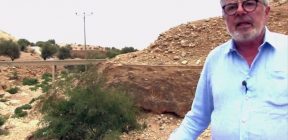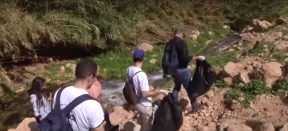NGO Monitor’s Review of Trócaire’s “This Is Palestine” Documentary
In July 2017, Trócaire and producer John McColgan released (on Vimeo and YouTube) This Is Palestine, a 50-minute documentary that claims to explore “the impact of ongoing conflict and military occupation on the people who live there.”
The documentary promotes a one-sided Palestinian narrative and features interviews with officials from political NGOs such as Combatants for Peace, Youth Against Settlements, Caritas, Breaking the Silence,1 and Rabbis for Human Rights, as well as with Haaretz columnist Gideon Levy. Israeli MFA spokesperson Emmanuel Nahshon also appears sporadically as an artificial form of “balance.”
There are numerous instances in which the film is biased and makes false claims, including the following:
Water Libel:
- (17:52) – McColgan stands at a dry valley of the Al-Auja spring, and claims that “…water flowed all year round that is until, 1967…”
- According to multiple independent studies of the spring and the Lower Jordan Rift Valley, “Auja spring displays high fluctuations linked to precipitation events.” This included a severe drought from 1992, resulting in “the Auja Spring was dry nearly year-round.”
- Additionally, McColgan overlooks the fact that Ein Samia, a major source of the Auja stream, was partially diverted to provide water to Ramallah from 1963 and the Palestinian Jerusalem Water Undertaking wells in the Ein Samia region, which also transfer water to Ramallah. The spring “underwent an intensive rehabilitation effort during 2007 and 2008,” and as recently as February 2017, EU Representative Ralph Tarraf visited Al Auja Spring, which can be seen flowing steadily.
- Screenshot of John McColgan at Al-Auja spring (date unknown)
- Screenshot of visit by EU rep to Al-Auja spring (February 2017)
Inaccurate Claims:
- (3:35) McColgan describes the brutal kidnapping and murder of Mohammed Abu Khdeir as a possible revenge attack carried out after the murder of two Jewish teens.
- Three Israeli teens, not two, were kidnapped and murdered by terrorists who dumped their bodies in an open field.
- (9:40) McColgan claims that “Israel has divided the West Bank in to three areas…”
- The division of the West Bank into Areas A, B, and C occurred due to the mutually agreed-upon Oslo Accords (1993) between Israel and the Palestinian Liberation Organization (PLO). The agreement was signed by the United States and Russia, and witnessed by the European Union.
Reliance on political NGOs and slogans
- (28:33) Labels Gaza as the “Largest open air prison,” reflecting a use of inaccurate NGO messages that disregard thousands of Gaza residents that regularly cross into Israel and over 800 trucks that enter Gaza daily carrying food, medical equipment, fuel, building materials, agricultural inputs, textile products and more.
- (02:47) The film’s description of the history of Jerusalem begins with the establishment of Israel in 1948 and then jumps to Israeli rule over “Israel West Jerusalem and Palestinian East” since 1967. This negates Jordanian rule of the eastern part of the city in 1948-1967.
- (19:30) Interviews members of Youth Against Settlements, an advocacy NGO whose activists have been arrested for incitement and threatening public safety.
- (20:40) Yehuda Shaul, founder of the political advocacy NGO Breaking the Silence, discusses his military services in Hebron in 2000. His unverifiable claims refer to events from over ten years ago, during a period of intense violence that claimed the lives of dozens of Israeli in Hebron.
- The documentary’s credits Palestinian NGOs and Trócaire “partners” Al-Haq, Palestinian Center for Human Rights (PCHR), and BADIL. Al-Haq and PCHR both have alleged ties to the Popular Front for the Liberation of Palestine (PFLP) terror group, and BADIL’s prize winning cartoons in its caricature competitions have featured classic antisemitic imagery.
- Desmond Travers is also thanked. Travers was one of the members of the Goldstone Commission and responsible for promoting false allegations of war crimes against Israel in the 2009 UN report on the 2008-2009 Gaza war. He previously described Jews as having an undue influence over British foreign policy.
Ignoring the Context of Terrorism against Israelis
- (05:45) McColgan observes the construction of the Israeli security barrier near Beit Jala and interviews Palestinians claiming “this is simply a land grab.” Information about Israeli and foreign citizens murdered in and around Beit Jala, including dozens of shooting attacks against Israeli vehicles that warrant security measures, are not mentioned.
- (36:00) Claims that the Gaza fishing community is denied access to fishing grounds, while disregarding Hamas’ efforts to smuggle weapons and other military equipment into Gaza via sea routs, including by using small fishing boats.


